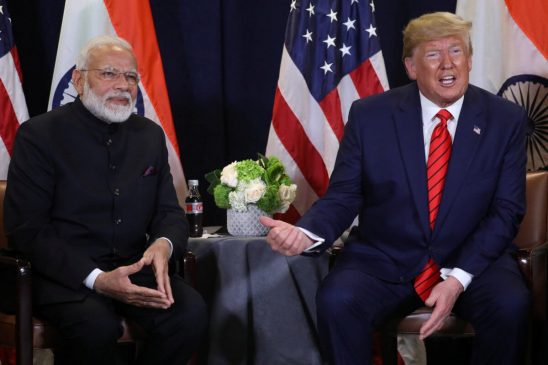- The Trump administration declared India a developed country, which means it will lose all the benefits it used to receive under the Generalized System of Preferences scheme.
- India’s Prime Minister Narendra Modi was planning to turn the country into a $5 trillion economy by 2024. The Trump administration’s decision delivered a deathblow to those plans.
- The threat of coronavirus and a slowing economy are looming large over India.
Earlier this week, the United States Trade Representatives (USTR) classified India as a ‘developed nation’. This means India will not receive any benefits under the Generalized Preferences Scheme (GSP), which eliminates duties on thousands of products imported from emerging countries.
India’s tariff-free access to the U.S. market is now over. The classification is a critical blow to Indian Prime Minister Narendra Modi’s Bhartiya Janta Party (BJP).
Meanwhile, India was planning to finalize a limited trade agreement with the U.S. when President Trump arrived in the country on Feb. 24. After USTR’s decision, the possibility of the deal’s announcement has now been called into question.
India has been the largest beneficiary of GSP, which was established by the Trade Act of 1974. It received benefits worth up to $260 million until 2018. The figure forms a small portion of India’s overall exports, which stand at $51 billion.
But when you consider other factors that will affect India’s economy in the coming years, the Trump administration’s decision will harm everything India’s ruling party set out to achieve.
India is Heading Towards a Middle-Income Trap
The USTR considers any country having a share of 0.5% or more of world trade as a ‘developed’ country. So it was well within its rights to classify India as a developed nation.
As a developing country, India enjoyed many benefits under the GSP that it will now have to relinquish. Under the scheme, India enjoyed duty-free and heavily subsidised exports to the U.S. Out of the total $5.6 billion of GSP-related trade; $190 million was duty free.
It helped India grow exports at a rapid pace, so losing access to the benefits is huge blow. And that may prove to be a big problem for Prime Minister Modi when you consider the sector-specific damage this could cause.
India is on the path to becoming a middle-income trapped country in the coming years. Boosting exports was a way for India to claw its way out. India is a domestic consumption-driven economy, but over the last few years, the consumption has flat-lined.
PM Modi’s economic adviser, Dr. Rathin Roy, recognized this in a 2019 interview:
India may end up as a basket case, much like Brazil. Instead of becoming another China.
The U.S. has been the largest importer of Indian goods. And India needed whatever benefits it could to grow their exports to the U.S.
Without the benefits, Indian companies will be at a severe disadvantage, and exports to the U.S. will come down.
Indian Manufacturers won’t Allow Modi-Government to Enter RCEP
Another opportunity to grow exports had arrived in the form of the Regional Comprehensive Economic Partnership (RCEP). Entering RCEP would have given India a free trade agreement with ten ASEAN countries and its six FTA partners.
RCEP was a golden opportunity for Indian manufacturers to test themselves against products from around the world. Entering a free-trade agreement with these countries, Indian companies would have to compete with overseas-made products on an equal footing.
If they had exposed themselves, there could have been lessons learned. And companies that could compete against foreign products on quality and cost would have gained access to huge markets in the RCEP countries.
It would have also helped increase the spending of Indian consumers by lowering tariffs on imported goods.
RCEP would have helped India claw its way out of the middle-income trap by both, growing exports and consumption.
But domestic manufacturers staged huge protests against it. Since Modi derives much of his support from local manufacturers, they eventually got their way. India refused to sign the deal, missing a huge opportunity to escape the middle-income trap.
Potential Coronavirus Outbreak Could Exacerbate the Death Blow
Coronavirus has been spreading like wildfire on the Chinese mainland. If the disease hits India, it could spread even faster. High population density, lack of resources and deplorable hygiene will provide fuel for the impending wildfire.
Reports out of India suggest there are multiple people under observation for a potential coronavirus infection.
If the disease hits India, it could crash the stock market and hurt local manufacturers. The slowdown in Chinese manufacturing has already started impacting Indian companies.
The Modi government’s handling of the Indian economy has already come under a lot of scrutiny and the recent events will add to the woes.
Ahead of President Trump’s state visit to India, PM Modi will likely be bubbling with frustration and may even feel cheated.
Modi recently helped President Trump garner more support from Indian voters in the U.S. President Trump returned the favor by delivering a death blow that can cause the Modi government to lose support for the 2024 election.
Disclaimer: The opinions expressed in this article do not necessarily reflect the views of CCN.com.
This article was edited by Sam Bourgi, Samburaj Das.
Last modified: February 16, 2020 8:45 AM UTC




